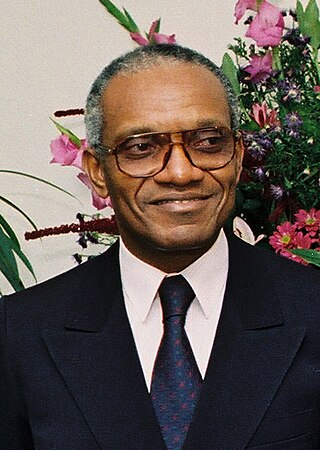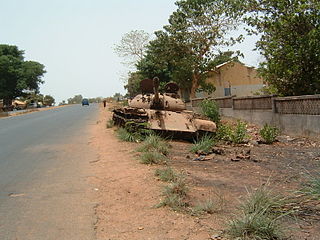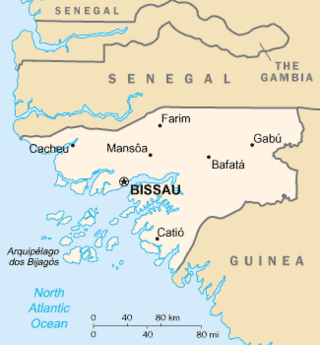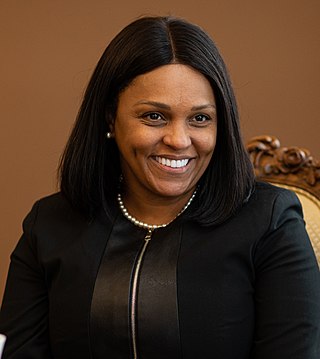
The Revolutionary Armed Forces of the People is the national military of Guinea-Bissau. It consists of an army, a navy, an air force, and paramilitary forces. The World Bank estimated that there were around 4,000 personnel in the armed forces. The estimated military expenditure are $23.3 million, and military spending as a percentage of GDP is 1.7%.

Miguel dos Anjos da Cunha Lisboa Trovoada was the prime minister from 1975 to 1979 and second president of São Tomé and Príncipe 1991 to 2001. On 16 July 2014, he was appointed the Special Representative of the United Nations Secretary-General and Head of the United Nations Integrated Peacebuilding Office in Guinea-Bissau (UNIOGBIS). Prior to this, he was the executive secretary of the Gulf of Guinea Commission.

The Guinea-Bissau Civil War was fought from 7 June 1998 to 10 May 1999 and was triggered by an attempted coup d'état against the government of President João Bernardo Vieira led by Brigadier-General Ansumane Mané. Government forces, backed by neighbouring states, clashed with the coup leaders who had quickly gained almost total control over the country's armed forces.

The United Nations Peacebuilding Commission (PBC) is a United Nations intergovernmental advisory body of both the General Assembly and the Security Council that supports peace efforts in conflict affected countries. A key addition to the capacity of the international community in the broad peace agenda, it was established in 2005 with the passage of both A/RES/60/180 and S/RES/1645 Mr. Ivan Šimonović (Croatia) is the incumbent chair of PBC.

The United Nations Department of Political and Peacebuilding Affairs (DPPA) is a department of the Secretariat of the United Nations (UN) with responsibility for monitoring and assessing global political developments and advising and assisting the UN Secretary General and his envoys in the peaceful prevention and resolution of conflict around the world. The department manages field-based political missions in Africa, Central Asia, and the Middle East, and has been increasing its professional capacities in conflict mediation and preventive diplomacy. DPPA also oversees UN electoral assistance to Member States of the organization. Established in 1992, the department's responsibilities also include providing secretariat support to the UN Security Council and two standing committees created by the General Assembly concerning the Rights of the Palestinian People and Decolonization. DPPA is based at the UN Headquarters in New York City.

Guinea-Bissau–United States relations are bilateral relations between Guinea-Bissau and the United States.

The United Nations Peacebuilding Support Office in Guinea-Bissau (UNOGBIS) was established by the United Nations Security Council in its Resolution 1233 in April 1999 to facilitate the general election and implementation of the Abuja Accord.

United Nations Security Council resolution 1216 was adopted unanimously on 21 December 1998. After expressing concern at the crisis and humanitarian situation in Guinea-Bissau, the Council called for the immediate establishment of a government of national unity in the National People's Assembly and the holding of elections by the end of March 1999.

United Nations Security Council resolution 1233, adopted unanimously on 6 April 1999, after reaffirming Resolution 1216 (1998) on the situation in Guinea-Bissau, the council established the United Nations Peacebuilding Support Office in Guinea-Bissau (UNOGBIS) to facilitate the implementation of the Abuja Accord.

United Nations Security Council resolution 1580, adopted unanimously on 22 December 2004, after reaffirming resolutions 1216 (1998) and 1233 (1999) on the situation in Guinea-Bissau, the Council extended the mandate of the United Nations Peacebuilding Support Office in Guinea-Bissau (UNOGBIS) for a further period of one year and revised its operations. It was the final Security Council resolution adopted in 2004.

United Nations Security Council Resolution 1949, adopted unanimously on 23 November 2010, after recalling previous resolutions on the situation in Guinea-Bissau, particularly Resolution 1876 (2009), the Council extended the mandate of the United Nations Integrated Peacebuilding Office in Guinea-Bissau (UNIOGBIS) for a further period of one year until 31 December 2011.
United Nations Security Council Resolution 1876 was unanimously adopted on 26 June 2009.

United Nations Security Council Resolution 2030 was unanimously adopted on 21 December 2011 after recalling resolution 1949 (2010). The Council called on the Government and political stakeholders in Guinea-Bissau to work together to consolidate peace and stability, use legal and peaceful means to resolve differences and intensify efforts for genuine and inclusive political dialogue and national reconciliation.

Presidential elections were held in Guinea-Bissau on 18 March 2012 following the death of President Malam Bacai Sanhá on 9 January. A run-off was set to be held on 29 April after being postponed by a week as announced by electoral commission chief Desejado Lima Dacosta. However, after a military coup, the leading candidates were arrested and the election was cancelled. The junta's spokesman then announced plans to hold an election in two years, despite condemnation. General elections were subsequently held in April 2014.
Prostitution in Guinea-Bissau is common and there are no prostitution laws. In 2016 it was estimated there were 3,138 prostitutes in the country. Often it is associated with other crimes: Many pimps are also reported to be drug dealers. Poverty leads many women to be tempted into prostitution and cocaine addiction.
The Segunda Esquadra is the main police station of Bissau, the capital city of Guinea-Bissau.
Maria do Valle Ribeiro or Maria Ribeiro is a United Nations diplomat. On 8 November 2016 she was appointed as the United Nations Deputy Special Representative and Deputy Head of the United Nations Support Mission in Libya (UNSMIL).
Filomena Mascarenhas Tipote is a Guinea-Bissauian politician who served as Minister of Foreign Affairs from 2001 to 2002 and Minister of Defence from 2003 to 2004.

Suzi Barbosa is a Bissau-Guinean politician, member of parliament and coordinator of the Committee of Women Parliamentarians of Guinea-Bissau.
Disability in Guinea-Bissau refers to the related affairs of people with disability in Guinea-Bissau.











